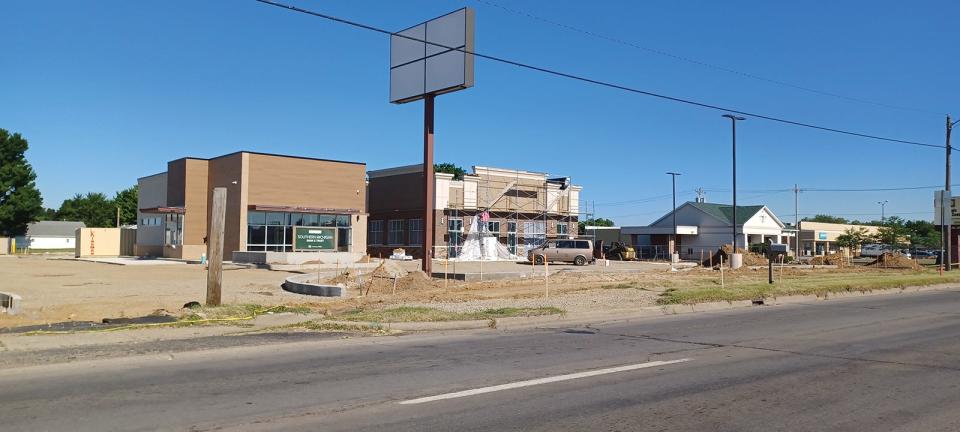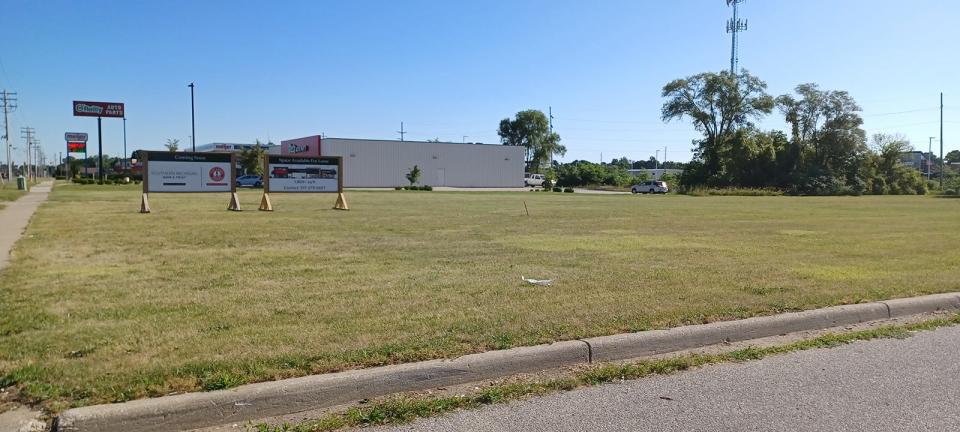A look at the process of bringing business to the city
Business is on the increase in Sturgis, with small shops and business fronts to large commercial and industrial projects being announced regularly.
From Freakin' Sweets to Illume, and Aldi to Heartland RV, the planning and city commissions have been processing, considering and approving business requests, with additional businesses working to open or expand.
How does the process work, and what does it take for a business to open in Sturgis? How much control or influence does the city have in what comes?
Those are questions recently addressed by Michael Hughes, Sturgis city manager, and Andrew Kuk, assistant city manager.
Where to begin
Kuk said the process of opening shop varies widely, based on the type of business.
"We encourage everyone to start with a meeting of the Business Development Team," he said. "This is a grouping of city staff that can help answer questions based on the type of business, where it is locating, what they need, and how far along the startup process they are."
"We get some developers, mostly those who are well-established and don’t involve the city until they are submitting construction drawings," Kuk said.
Beyond regulations, there is little need to involve the city.
"They can buy the land, lease the space, set up shop and open without talking with us, assuming zoning, building, wastewater permitting, etc. are not issues," Kuk said.
The ideal process involves the prospective business owner approaching the city prior to site location, sitting down with the BDT and talking through their site requirements, utility needs, business model, and more, Kuk said.
"We would then talk to them about different site options, public and privately owned, utility availability, etc.," he said. "From there, they would make a selection on location and engage us again on the development, asking new questions focused on their location."
Additional steps depend on the type of business and what needs to happen to make the site ready.
"Do we need to rezone for the project or have a special land use approved?" Kuk said of typical questions that must be answered. "Is it a project that needs, or can access, state or local tax incentives such as grants or tax abatements? Is the business building or renovating in a way that requires building permits? Is utility usage such that it needs special permits or changes to utilities to accommodate their use? Are they looking to buy publicly held industrial park property? All these questions lead to different steps that may need to be addressed."
Based on the project, additional steps may involve the state, local or regional economic development boards, Sturgis Planning Commission or Sturgis City Commission, Kuk said.
Surprise announcements
Sometimes, the business announcement is just as big of a surprise to residents as it is the city office.
The city is often approached by third-party representatives, inquiring about a construction project, Hughes said. That go-between route is often employed to prevent pre-emptive release of development information and to secure property at fair costs.
“Sometimes, we don't always know what the (storefront) business will be,” Hughes said.
Hughes said the city does not control what property owners decide to do with their properties or businesses.
"The city does not always know what is transpiring between buyers and sellers," Hughes said. The decision on buying and selling is between them in a free-market society.
As was the case with Aldi, Hughes said, "by the time we know, they already have a deal finalized."
When a business indicates interest in coming to Sturgis, the city’s priority is to work with that business, leaving the public relations aspect up to the developer.
“There's often a business deal in place with contingencies, and if there's complications, they'll pull out,” Hughes said.
No limits
The city also has no desire to limit business.
“We don’t see our role as that,” Hughes said. “We see our role as regulatory, to ensure it meets an approved zoning use."
From there, Kuk said, the customers determine whether a business will succeed.
“It is an impossible task to say, ‘no, we don't think this business should be here because we already have others like it,” Hughes said.
"We are economic developers and want new business, and to see business expand, but also to meet the (development) requirements," Hughes said. "Some may find success, others find the process complicated. Health and building codes require due diligence."
Despite that diligence, sometimes the developer simply runs into an issue.
"They will announce, buy a building and then find barriers they can't reasonably work around financially, whether it's stormwater, fire suppression or electrical," Hughes said.
"We can be proactive and meet people where they're at and help them understand what goes into starting a business," Hughes said. "There are a lot of regulations out there. It's not us, not the city. That's just what is."
Hughes said each project needs a catered approach, as the duration of a project from announcement to opening has much to do with the uniqueness of the business.
"When projects go through zoning requirements and site plans, they often do not have building construction drawings done yet," he said. "Many businesses understand if they meet requirements for site plans, they'll be able to build."
The opening of a business also cannot be compared to ordinance-based interests, such as allowing urban chickens in the city limits.
That, city officials said, was entirely about requesting changes to an existing ordinance versus a permitted use already in place, where the entity has to meet the established requirements.
Attracting new business
How much work does the city devote to attracting new business to Sturgis?
"I would say (it is) 90% businesses contacting us versus 10% us contacting businesses," Kuk said. "The proactive piece has mostly been revolving around a few target market segments we feel are lacking in the community and then, submitting industrial park property for site selection processes. The industrial Park Site Selection submissions were done when we still had available industrial park property to market."
The challenge with “proactive” marketing, Kuk said, is having something to “sell” to a company, whether that is available land, tax incentives or a building.
"For a long time, our most marketable asset was industrial park property and thus we were seeking out fits," Kuk said.
"For, let's say, big box retail, we didn’t have much to talk about; the city did not control land, most incentives are not geared to those industries, and they really know where they want to be," Kuk said.
With the city's acquisition of property near the Indiana state line, that helps fill the niche potential.
"We now have a site to market,” Kuk said.
The city's role in filling some of the vacancies that appear marketable can also be a variable.
"For example, when Kroger left, we spoke with Regency and offered assistance, but they have a team that markets their property and largely left us out of it," Kuk said. "We talked about things that would make sense for Sturgis and space — one of which was Aldi — but that was as far as our role went. We often play facilitator on those types of sites – if we know someone is interested, we offer those spaces as options and make connections."
Whether industrial or retail, businesses looking to expand know where they want to go from a demographic or geographic standpoint.
"If Amazon, for example, doesn’t want to be in a community the size of Sturgis, there is little we can say to convince them," Kuk said. "If they are looking for a smaller town in a rural area with available land, then you make your pitch, often through a formal process through Southwest Michigan First and, ultimately, the state.
On the retail end, Kuk said, the same process applies.
“One may want Chick-Fil-A, Five Guys or Panera Bread, but unless their demographic profile says we are a fit, they probably are not looking here. That is the case with many of those businesses. There are businesses that may 'fit' here and those are the ones you can target, as long as you have something to (offer)."
How long does it take?
Under ideal circumstances, how long does it take for a business to open from first contact?
Eighteen months to two years is a seamless process for a significant development. Smaller businesses can move quicker, quicker still if it is a straight-forward startup: 120 days. That's from first contact to doors open."
Regarding misconceptions about the city and business invitations, Kuk said the biggest misunderstanding by some "is that we have some type of ultimate control or discretion over what locates here in Sturgis."
"Developers do not ask us if we want a 'this' or a 'that,' he said. "The developers and businesses are looking for Sturgis - or someplace like it - and are able to find the right mix of property/workforce/x-factor to make opening a business here profitable."
The marijuana industry is active in Sturgis, Kuk said, "because we allow their business type and their industry has been in a development boom since it became legal," as is the case in many other communities across Michigan.
"We don’t turn people away because we don’t like their business concept or don’t want 'X' here," Kuk said. "If it is a legal business and can be legally zoned, constructed, served with utilities, and permitted, it will be opened in the city of Sturgis."
The cannabis boom, while good for property owners looking to sell, according to Kuk, has driven up industrial property values.
"That has limited the potential space for other industrial businesses in town, but it is a free-market factor," he said.
The future
What is on the horizon for Sturgis?
"The biggest change for us right now is the new, available property purchased near the state line," Kuk said. "We will be working to develop it into available space for retail and industrial development ... something that can be marketed."
"A lot of infrastructure work is on the horizon to set us up for future development," he said.


This article originally appeared on Sturgis Journal: Business

